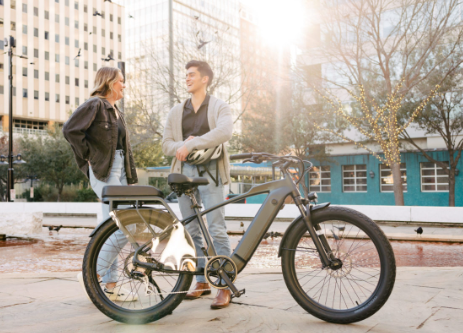The Economic Impact of eBikes

In recent years, electric bicycles (eBikes) have surged in popularity, evolving from a niche market to a significant player in the global transportation sector. This growth is not just a trend; it’s a revolution with substantial economic implications. The rise of eBikes is reshaping industries, influencing consumer spending, and altering urban infrastructure. In this article, we’ll explore the economic impact of eBikes.
Boost to the Cycling Industry
The eBike phenomenon has invigorated the cycling industry. Sales of eBikes have skyrocketed, leading to increased revenue for manufacturers, retailers, and associated businesses. This growth isn’t confined to specific regions; it’s a global phenomenon, with notable expansion in Europe, North America, and Asia. The demand for eBikes has spurred innovation, leading to advances in battery technology, motor efficiency, and bike design.
Job Creation and Market Expansion
The expanding eBike market has created a wide array of job opportunities. From manufacturing and assembly to sales and maintenance, the industry requires a diverse workforce. The rise in eBike popularity has also spawned new businesses such as rental services, tour companies, and specialized repair shops. Additionally, app developers and tech firms are tapping into this market, creating software for navigation, ride-sharing, and fitness tracking.
The Economic Impact of eBikes on Consumer Savings and Spending
eBikes offer a cost-effective alternative to traditional transportation methods. They reduce reliance on cars, leading to savings on fuel, parking, and maintenance costs. For consumers, these savings can translate into increased disposable income and a shift in spending patterns. The initial investment in an eBike is often offset by long-term savings, making them an economically attractive option for a broad range of users.
Impact on Urban Infrastructure and Public Spending
Cities around the world are adapting to the rise of eBikes. This adaptation often involves significant investment in cycling infrastructure, such as bike lanes and parking facilities. While this requires initial public spending, the long-term benefits include reduced traffic congestion, lower pollution levels, and decreased wear and tear on roads. Improved cycling infrastructure also enhances the appeal of cities as tourist destinations, potentially boosting local economies.
Environmental Benefits, Sustainability and the Economic Impact of ebikes
The environmental aspect of eBikes contributes to their economic impact. By providing a greener alternative to cars and motorbikes, eBikes help reduce carbon emissions and pollution. This shift can lead to decreased healthcare costs associated with pollution-related illnesses. Furthermore, the focus on sustainability is driving governmental incentives and subsidies for eBike purchases, further stimulating the market.
Challenges and Future Outlook on The Economic Impact of eBikes
Despite the positive economic impact, there are challenges. The need for improved battery recycling processes and concerns about the sourcing of materials for batteries are issues that the industry must address. Looking ahead, the eBike market is poised for continued growth, with technological advancements and increasing awareness of environmental issues fueling its expansion.
Conclusion
The economic impact of eBikes extends far beyond their role as a mode of transportation. They are a catalyst for industry growth, job creation, consumer savings, and urban development. As cities evolve to become more bike-friendly, and as technology continues to advance, the role of eBikes in shaping economic landscapes will undoubtedly expand. Embracing this eBike revolution offers a pathway to more sustainable, efficient, and economically vibrant communities. John
Click here to see the best eBikes rated and ranked
Links to the Top Three eBike Manufacturers
FAQ’s
Are Ebikes cost efficient?
eBikes can be cost-efficient, especially when compared to other forms of transportation like cars or public transit, though the level of cost efficiency depends on various factors. Here are some key points to consider:
- Initial Investment: The upfront cost of an eBike can be higher than a traditional bicycle, but it’s generally much lower than buying and maintaining a car. Prices for eBikes vary widely based on brand, quality, and features.
- Maintenance Costs: eBikes have higher maintenance costs than regular bikes due to their electrical components, but these costs are typically lower than maintaining a car. Regular maintenance is essential to keep an eBike in good condition.
- Operating Costs: The cost of charging an eBike’s battery is much lower than fueling a car. The electricity cost for charging an eBike is relatively minimal, making it an economical option for daily commuting.
- Transportation Savings: Using an eBike for commuting or running errands can significantly reduce or eliminate costs associated with car ownership, such as fuel, parking fees, insurance, and tolls. For urban dwellers, this can lead to substantial savings.
- Health and Environmental Benefits: While not directly related to financial cost, using an eBike has health benefits due to increased physical activity and environmental benefits due to reduced carbon emissions. These factors can contribute to indirect savings in terms of healthcare costs and environmental impact.
- Dependence on Distance and Usage: The cost efficiency of an eBike is higher for those who use it regularly and for considerable distances. If the eBike is only used occasionally, the cost savings over other transportation modes may be less significant.
- Resale Value: eBikes, especially from reputable brands, can retain a reasonable resale value, which can be factored into the overall cost efficiency.
In summary, eBikes can be a cost-efficient choice, particularly for regular commuters and city dwellers. The savings in fuel, parking, and other car-related expenses, combined with the relatively low operating and maintenance costs, make eBikes an economically attractive option for many people.
What are the social impacts of e-bikes?
The social impacts of e-bikes are broad and significant, touching on various aspects of daily life, urban planning, and community interaction. Here are some of the key social implications:
- Increased Mobility and Accessibility: eBikes make cycling more accessible to a wider range of people, including older adults, those with physical limitations, or those who might find traditional cycling too strenuous. This increased accessibility can enhance social inclusion and independence.
- Environmental Awareness and Behavior Change: The rise of eBikes contributes to a growing awareness and adoption of environmentally friendly practices. By choosing eBikes over cars for short trips, individuals can reduce their carbon footprint, leading to a collective impact on environmental conservation.
- Urban Planning and Public Spaces: The popularity of eBikes is influencing urban planning. Cities are increasingly investing in bike-friendly infrastructure, such as bike lanes and parking facilities, which can lead to more livable, clean, and efficient urban spaces.
- Health and Wellbeing: eBikes encourage physical activity, albeit at a lower intensity than traditional bikes. This can contribute to improved public health, reducing the burden of lifestyle-related diseases. The mental health benefits of engaging in outdoor activities and cycling are also significant.
- Community and Social Interaction: eBikes can strengthen community ties by enabling more people to participate in cycling groups and outdoor activities. They also make it easier to run errands, visit friends, or explore new areas, fostering social interaction and community engagement.
- Economic Effects: By making transportation more affordable and accessible, eBikes can have positive economic implications for individuals, particularly in urban settings where the cost of owning and maintaining a car is high.
- Reduction in Traffic Congestion: eBikes can help reduce traffic congestion in cities, leading to shorter travel times and less stress for commuters, contributing to a more pleasant urban environment.
- Safety and Public Perception: The increasing number of eBikes on the road also brings challenges in terms of safety and public perception. There is a need for public education about sharing the road safely and adapting to the presence of faster bicycles.
- Tourism: eBikes have expanded opportunities in tourism, allowing more people to participate in cycling tours and explore areas that might have been too challenging to access with traditional bikes.
- Education and Skill Development: Learning to safely operate and maintain an eBike can contribute to skill development and a greater understanding of sustainable technology.
In conclusion, eBikes have a multifaceted social impact, contributing positively to health and environmental awareness, urban living, and community engagement. As their popularity grows, these impacts are likely to become more pronounced, shaping aspects of social interaction and urban development.
How eco friendly are Ebikes?
eBikes are generally considered eco-friendly, especially when compared to motor vehicles like cars and motorcycles. Their environmental impact is lower in several key areas:
- Emissions: eBikes produce zero emissions during operation, making them a clean mode of transport. While the production and charging of the bike and its battery do have some environmental impact, it’s significantly less than that of gasoline-powered vehicles.
- Energy Efficiency: eBikes are highly energy-efficient. The amount of energy required to charge an eBike battery is a fraction of what is needed to fuel a car. This efficiency translates to less strain on natural resources and lower greenhouse gas emissions.
- Reduced Traffic Congestion: eBikes can help alleviate traffic congestion in urban areas. This reduction can lead to lower overall emissions from idling vehicles and contributes to a decrease in air pollution.
- Noise Pollution: eBikes are much quieter than motor vehicles, contributing to reduced noise pollution in urban environments.
- Battery and Motor Manufacturing: The manufacturing process for batteries and electric motors does have an environmental impact, including the extraction of raw materials and energy used in manufacturing. However, advancements in technology and recycling are gradually reducing this impact.
- Lifecycle and Disposal: The environmental friendliness of an eBike also depends on its lifecycle. Proper disposal and recycling of eBike batteries are crucial to minimize environmental impact. As recycling processes improve, the ecological footprint of eBikes could be further reduced.
- Promotion of Sustainable Practices: The growing popularity of eBikes encourages the development of sustainable urban infrastructure, like bike lanes and green spaces, and promotes a more environmentally conscious culture.
- Alternative to Cars for Short Trips: For short trips in urban settings, eBikes are an excellent alternative to cars. This switch can significantly reduce the carbon footprint of daily commutes and errands.
In summary, eBikes are a more eco-friendly alternative to traditional motorized vehicles, offering a sustainable solution for transportation, particularly in urban settings. Their adoption can play a crucial role in reducing emissions, energy consumption, and noise pollution, contributing positively to environmental conservation and the promotion of greener urban landscapes.
What are the benefits of Ebikes?
eBikes offer a wide range of benefits, making them an increasingly popular choice for transportation, recreation, and fitness. Some of their key advantages include:
- Eco-Friendly: eBikes are environmentally friendly, producing zero emissions during operation. They help reduce reliance on fossil fuels and contribute to lower air pollution and greenhouse gas emissions.
- Improved Mobility: eBikes make cycling accessible to a broader range of people, including older adults, those with physical limitations, or those who may find traditional cycling too demanding. This improved mobility enhances independence and can expand personal travel options.
- Health and Fitness: Riding an eBike still involves physical exercise, albeit less strenuous than traditional cycling. It’s a great way to improve cardiovascular health, build muscle strength, and enhance overall fitness while being easier on the joints.
- Cost-Effective: Operating an eBike is much cheaper than driving a car, particularly in terms of fuel costs. Maintenance expenses are also generally lower than those for a car.
- Time Efficiency: In urban areas, eBikes can be faster than cars for short to medium distances, especially during peak traffic times. They allow riders to bypass traffic congestion and often have access to bike lanes and shortcuts.
- Convenience and Flexibility: eBikes provide the flexibility to switch between pedaling and using the electric motor, making it easier to tackle hills and headwinds, and arrive at destinations without excessive sweating.
- Fun and Enjoyment: eBiking can be a lot of fun. The added speed and reduced effort compared to a regular bike can make rides more enjoyable, encouraging people to cycle more often.
- Reduced Traffic Congestion: By providing an attractive alternative to cars, eBikes can help decrease traffic congestion in cities, leading to a more efficient and pleasant urban environment.
- Increased Range: The assistance from the electric motor allows riders to cover longer distances more easily than with a conventional bicycle, expanding their range for commuting or exploring.
- Supports Sustainable Urban Development: The growing popularity of eBikes supports the development of bike-friendly infrastructure and sustainable urban environments.
- Safety: For some riders, the ability to quickly accelerate and keep up with traffic can feel safer than riding a traditional bike, especially in urban areas.
- Accessibility for Tourism: eBikes open up new opportunities in tourism, allowing more people to participate in cycling tours and explore areas that might have been too challenging with traditional bikes.
Overall, eBikes offer a versatile, environmentally friendly, and enjoyable mode of transportation, with benefits that appeal to a wide range of people for various reasons.






